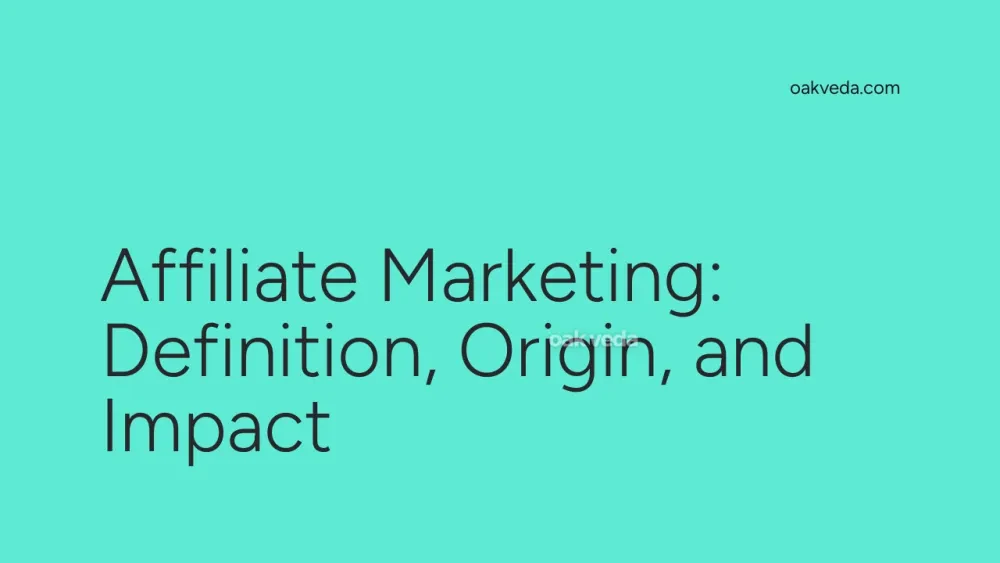
What is Affiliate Marketing?
Affiliate marketing is a performance-based marketing strategy where businesses reward affiliates for driving customers or sales through their promotional efforts. In this model, affiliates earn commissions by promoting products or services to their audience, typically through digital channels such as websites, social media platforms, or email marketing campaigns.
Origin and Development of Affiliate Marketing
The concept of affiliate marketing dates back to the early days of e-commerce in the 1990s. Amazon.com is often credited with popularizing the practice when it launched its Associates Program in 1996. Since then, affiliate marketing has evolved significantly, adapting to new technologies and digital platforms.
How Affiliate Marketing Works
- Partnership: A business partners with affiliates (individuals or companies) to promote their products or services.
- Unique Identifiers: Affiliates receive unique links or codes to track their promotional efforts.
- Promotion: Affiliates market the products or services to their audience through various channels.
- Tracking: When a customer clicks on the affiliate's link and makes a purchase, it's tracked by the business.
- Commission: The affiliate earns a commission based on the agreed-upon terms (e.g., percentage of sale or fixed amount per customer).
Types of Affiliate Marketing
- Pay-per-sale: The most common model, where affiliates earn a commission for each sale they generate.
- Pay-per-lead: Affiliates are compensated for generating leads, such as sign-ups or form submissions.
- Pay-per-click: Affiliates earn money based on the number of clicks their promotional efforts generate.
Popular Examples of Affiliate Marketing
- Amazon Associates: One of the largest and most well-known affiliate programs.
- Shopify Affiliate Program: Offers commissions for referring new merchants to the e-commerce platform.
- Booking.com Affiliate Partner Program: Allows partners to earn commissions on hotel bookings.
Impact of Affiliate Marketing on Social Media Culture
Affiliate marketing has significantly influenced social media culture by:
- Monetizing Influence: Enabling content creators and influencers to monetize their following.
- Changing Content Creation: Encouraging the production of product-focused content and reviews.
- Blurring Advertising Lines: Sometimes leading to concerns about transparency in sponsored content.
Controversies Surrounding Affiliate Marketing
- Disclosure Issues: Lack of proper disclosure of affiliate relationships has led to regulatory scrutiny.
- Over-promotion: Some affiliates prioritize commissions over providing genuine value to their audience.
- Cookie Stuffing: Unethical practices to artificially inflate commission earnings.
How Brands and Influencers Use Affiliate Marketing
Brands:
- Expand reach through affiliates' networks
- Increase sales with performance-based marketing
- Build brand awareness through diverse promotional channels
Influencers:
- Monetize their audience and content
- Diversify income streams
- Collaborate with brands aligned with their niche and values
Future Trends in Affiliate Marketing
- AI and Machine Learning: Improving targeting and personalization in affiliate campaigns.
- Voice Search Optimization: Adapting affiliate content for voice-activated devices.
- Increased Focus on Micro-Influencers: Leveraging niche audiences for higher engagement rates.
- Video Content: Growing emphasis on video-based affiliate marketing, especially on platforms like YouTube and TikTok.
FAQs about Affiliate Marketing
1. How much can I earn from affiliate marketing?
Earnings vary widely depending on factors such as niche, audience size, and promotional efforts. Some successful affiliates earn six-figure incomes, while others may earn supplementary income.
2. Is affiliate marketing still profitable in 2023?
Yes, affiliate marketing remains profitable for many. However, success requires strategic planning, quality content creation, and consistent effort.
3. How do I choose the right affiliate programs?
Select programs that align with your audience's interests, offer competitive commission rates, and provide quality products or services. Research the brand's reputation and support for affiliates.
4. Do I need a website to do affiliate marketing?
While having a website can be beneficial, it's not strictly necessary. Many successful affiliates use social media platforms, email marketing, or video content to promote affiliate products.
5. How can I disclose affiliate relationships to my audience?
Be transparent about your affiliate partnerships by clearly stating your relationship with the brand in your content. Follow FTC guidelines for proper disclosure in your country.
Affiliate marketing has become a cornerstone of digital marketing strategies, offering benefits to businesses, content creators, and consumers alike. As the digital landscape continues to evolve, affiliate marketing adapts, presenting new opportunities and challenges for those willing to navigate this dynamic field.
You may be interested in:
- Banger: Definition, Origin, and Impact in Social Media
- Moots: Definition, Origin, and Impact on Social Media
- Content Calendar: Definition, Origin, and Impact on Social Media
- SRP (Social Relationship Platform): Definition, Origin, and Impact
- Main Character Energy: Definition, Origin, and Impact
- CTR (Click-Through Rate): Definition, Origin, and Impact

